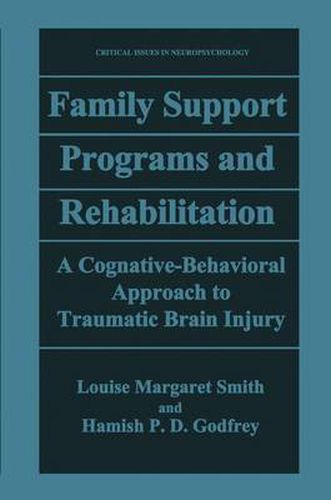Readings Newsletter
Become a Readings Member to make your shopping experience even easier.
Sign in or sign up for free!
You’re not far away from qualifying for FREE standard shipping within Australia
You’ve qualified for FREE standard shipping within Australia
The cart is loading…






This title is printed to order. This book may have been self-published. If so, we cannot guarantee the quality of the content. In the main most books will have gone through the editing process however some may not. We therefore suggest that you be aware of this before ordering this book. If in doubt check either the author or publisher’s details as we are unable to accept any returns unless they are faulty. Please contact us if you have any questions.
The permanent effects of traumatic brain injury (TBI) are not limited to the person who suffers the injury. People who care for the individual, particularly family members, suffer in various ways. Family members are often confused as to the behavioral and neuropsychological changes that they see in a brain-injured rela tive. They can become frustrated and angry when the individual does not return to premorbid levels of functioning. They can become tired and worn down from repeated problems in trying to manage the individual’s difficulties while having only fragmented information regarding them. Drs. Smith and Godfrey have provided a useful service for family members by summarizing important neuropsychological changes associated with TBI and providing practical guidelines for coping with these problems. While the neuropsychological problems they describe are not completely understood, the authors provide a useful description of many of the neuro behavioral problems seen following TBI in young adults. They attempt to provide guidelines for family members that have practical utility in understanding and managing these patients. Theirs is a cognitive-behavioral approach that can have utility for this group of individuals. I applaud their efforts to provide something systematic and practical for family members.
$9.00 standard shipping within Australia
FREE standard shipping within Australia for orders over $100.00
Express & International shipping calculated at checkout
This title is printed to order. This book may have been self-published. If so, we cannot guarantee the quality of the content. In the main most books will have gone through the editing process however some may not. We therefore suggest that you be aware of this before ordering this book. If in doubt check either the author or publisher’s details as we are unable to accept any returns unless they are faulty. Please contact us if you have any questions.
The permanent effects of traumatic brain injury (TBI) are not limited to the person who suffers the injury. People who care for the individual, particularly family members, suffer in various ways. Family members are often confused as to the behavioral and neuropsychological changes that they see in a brain-injured rela tive. They can become frustrated and angry when the individual does not return to premorbid levels of functioning. They can become tired and worn down from repeated problems in trying to manage the individual’s difficulties while having only fragmented information regarding them. Drs. Smith and Godfrey have provided a useful service for family members by summarizing important neuropsychological changes associated with TBI and providing practical guidelines for coping with these problems. While the neuropsychological problems they describe are not completely understood, the authors provide a useful description of many of the neuro behavioral problems seen following TBI in young adults. They attempt to provide guidelines for family members that have practical utility in understanding and managing these patients. Theirs is a cognitive-behavioral approach that can have utility for this group of individuals. I applaud their efforts to provide something systematic and practical for family members.